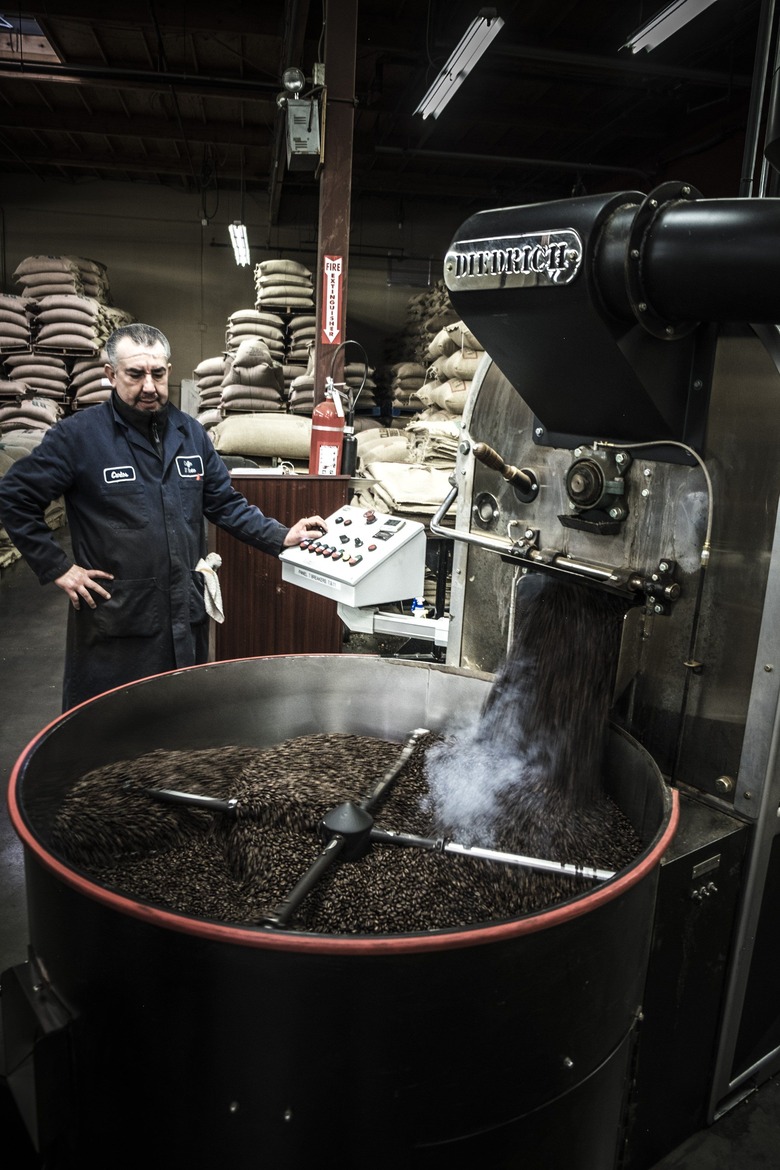10 Reasons Why You Should Be Drinking Caffe D'arte
Boasting more coffee shops per capita than any other American city (35 for every 100,000 residents), Seattle is the capital of caffeine. Dozens of regional roasters ensure that Seattleites can choose sips that align with our affection for locally sourced goods. One of them, Caffe D'arte, flies relatively low under the radar in spite of being one of the city's first, due to a business model that is 95 percent wholesale. I became hooked on this heritage roaster after tasting its wood-roasted coffee. (Who knew that was a thing?) This exceptional cup led me to its Federal Way roasting plant, where I got the scoop on what makes this longstanding brand tick. Here are 10 reasons to put Caffe D'arte on your to drink list:
Wood-roasting
One of the few American roasters to use wood, Caffe D'arte crafts two specialty blends using the same 1949 Balestra wood roaster that founder Mauro Cipolla brought from Italy when the company began. This traditional technique lends delicious depth and character to the coffee. Stay tuned later this spring, when Caffe D'arte will launch the first ever organic, fair-trade, wood-roasted cold brew. This luscious, full-bodied quaff is low in acid and big on flavor.
New Digs
Although the building that houses its original Stewart Street café will be torn down, Caffe D'arte just opened a new shop in the heart of Pioneer Square. From Americanos to Truffled Mochas, the well-trained baristas serve every drink with a smile. I'm smitten with the Dolce Fine, a deliciously decadent three-layer shot of espresso, cream, and vanilla syrup. Pair your coffee with people watching — this prime corner location offers ample window seating.
Small-Batch Roasting
General manager Joe Mancuso uses a cooking metaphor to illustrate why Caffe D'arte roasts in small batches. "To cook for four is better and more satisfying than [cranking out] a meal for 300," he explains, patting his well-fed belly to punctuate his words. By being hands-on instead of automated, the experienced staff can be more nimble, ensuring the consistency and quality for which the company is known.
Blending
Caffé D'arte is devoted to the art of "post-blending." In this complex technique, single-origin coffees are roasted separately to bring out their unique flavors. They are then combined together per a specific recipe to create multi-dimensional blends, each of which has its own aroma, body, and character. Gourmet Retailer Magazine recognized Mauro Cipolla as one of the 25 most influential people in coffee thanks to his pioneering efforts with blending.
Italy-Taught Founder
In 1985, the same year that Starbucks began pulling shots with La Marzocco machines, Italian-born Cipolla set up shop in Seattle. After apprenticing with a fourth-generation master roaster in Naples, the passionate Italian brought his expertise and recipes across the Atlantic. Italy's coffee heritage is infused into the entire company, as illustrated by the red, white, and green Simonelli espresso machines that line its Pioneer Square café.
Craftsmanship
While the younger generation of coffee roasters focus more on the story behind the beans and branding, Caffe D'arte concentrates on the craft. As the name suggests — Caffe D'arte is "artful coffee" in Italian — the company combines blending and Italian roasting expertise with extensive knowledge of coffee history to create the beloved roasts.
Community
Many of Caffe D'arte's employees have been with the company long-term; two roasters, Manuel and Carlos, have proudly worked there for more than a dozen years. Caffe D'arte also supports the surrounding community, donating the burlap bags that transport the beans from South and Central America to local nurseries. This female writer was also impressed to learn the company refuses to sell its beans to bikini-clad barista espresso stands.
History
Caffe D'arte is part of the Seattle coffee narrative, as one of the first artisan roasters in town. Their roasting machines are also steeped in history. A 1949 Balestra is used for the wood-roasted blends. Other coffee companies claim to have "one of the first" Diedrich roasters, but Caffe D'arte actually has the third machine the Idaho-based, 30-year old company ever built.
Education
"It all starts behind the bar," explains Mancuso, reinforcing Caffe D'arte's commitment to coffee education. Each week, at its Federal Way facility, the owners host wholesale customers, food and beverage professionals, and coffee enthusiasts to teach them how to properly make, serve, and store coffee. Give a man an espresso, and he'll drink for a day. Teach a man to properly pull an espresso shot, and he'll delight others for a lifetime.
Latte Art
The caffeinated curriculum continues with a latte art class. Soon to be offered at the Pioneer Square shop, these hands-on courses are offered at the Federal Way headquarters. My teacher, barista trainer Meagan Bennett, patiently teaches me, guiding my hands to help me craft a creamy, albeit lopsided, heart. Like surfing, latte art is way harder than it looks. I have a newfound appreciation for the milk masterpieces that adorn my drinks, especially those made in the early morning hours.
